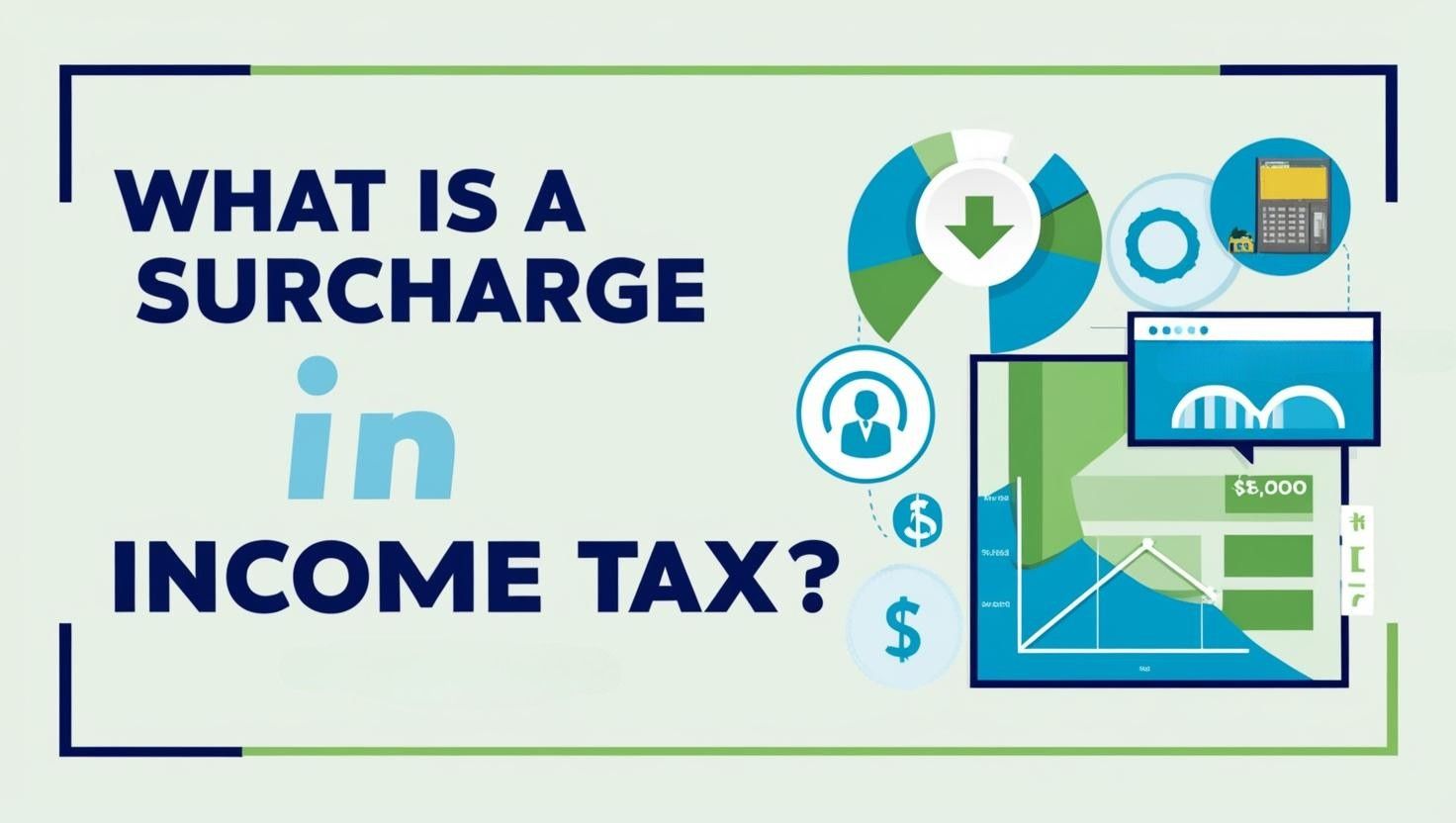Comprehensive Guide to Surcharge in Income Tax Explained
Introduction
Taxes can sometimes feel overwhelming due to their complexities. Among these, the concept of a “surcharge” in income tax often adds to the confusion. A surcharge is an additional charge on income tax liability that applies to specific taxpayers, particularly those with higher incomes.
Understanding how surcharges work is essential for taxpayers, especially high earners, as it can significantly influence their total tax payable. In this blog, you will learn about the meaning of a surcharge, who is liable to pay it, how it is calculated, and the current surcharge rates for individuals and other entities.
What is Surcharge in Income Tax?
A surcharge is an additional tax levied on the income tax liability of taxpayers who earn above certain thresholds of taxable income. Importantly, it is applied to the income tax payable and not directly to the income itself.
Both individuals and entities, such as Hindu Undivided Families (HUFs) and domestic companies, may be subject to this surcharge. The surcharge ensures that higher-income earners contribute proportionately more to government revenue.
For example, taxpayers with income above Rs 50 lakhs or Rs 1 crore are required to pay a surcharge tax on their income tax liability. Understanding what is surcharge in income tax is key to planning your financial obligations effectively.
Surcharge was introduced to address income inequality and boost tax revenues. By targeting higher-income groups, the government ensures equitable contribution to national development. As income rises, the surcharge rate escalates, ensuring a progressive tax structure.
Historical Perspective on Surcharge
The concept of a surcharge in India has evolved over the years. Initially introduced as a temporary measure, it has now become a permanent feature of the tax system. Its rates and thresholds have seen periodic revisions in response to changing economic conditions.
Who is Liable to Pay Surcharge?
Surcharge liability primarily falls on:
- Individuals earning above specific income thresholds.
- Hindu Undivided Families (HUFs) with taxable income exceeding certain limits.
- Other entities such as artificial judicial persons and domestic companies.
Taxable Income Thresholds for Surcharge
- Taxable income exceeding Rs 50 lakhs.
- Taxable income exceeding Rs 1 crore.
- Taxable income exceeding Rs 5 crore.
For individuals and HUFs, these thresholds dictate the rate of surcharge applied, as detailed in the next section. Tax above 50 lakhs is where the surcharge tax liability begins.
Additionally, entities like domestic companies face surcharge rates based on their total taxable income. High-earning companies, including those in sectors like IT and manufacturing, often account for a significant portion of surcharge collections.
Surcharge Rates for Individuals and HUFs
The current surcharge rates for individuals and HUFs are:
- 10% for income above Rs 50 lakhs up to Rs 1 crore.
- 15% for income above Rs 1 crore up to Rs 2 crore.
- 25% for income above Rs 2 crore up to Rs 5 crore.
- 37% for income above Rs 5 crore.
These surcharge rates for individuals illustrate how the surcharge escalates progressively with higher income levels, ensuring fairness in the tax system.
Surcharge Rates for Other Entities
Domestic companies face surcharges based on their income levels, with rates typically ranging from 7% to 12%. For foreign companies operating in India, the surcharge structure may differ based on their compliance with domestic tax laws.
Income Tax Surcharge Calculation
To calculate the surcharge:
- Determine the taxable income.
- Calculate the income tax based on applicable slab rates.
- Apply the surcharge rate corresponding to the income bracket on the tax payable.
Example Calculation
Assume a taxable income of Rs 1.2 crore. The steps are:
- Calculate income tax as per applicable slabs.
- Apply a 15% surcharge on the computed tax liability.
- Factor in marginal relief if the surcharge amount increases the total tax liability disproportionately compared to the income exceeding the threshold.
Detailed Breakdown
- Income Tax: Rs 30,00,000 (approx.).
- Surcharge (15%): Rs 4,50,000.
- Total Tax Payable: Rs 34,50,000.
Using these steps ensures accurate income tax surcharge calculation, preventing overpayment.
Marginal Relief Explained
Marginal relief provides relief to taxpayers whose additional income slightly exceeds the surcharge threshold, ensuring they do not pay more surcharge than the extra income earned.
Surcharge Application Under Different Tax Regimes
The surcharge applies under both the old and new tax regimes, but the impact may vary:
- Under the old tax regime, deductions and exemptions may reduce taxable income, affecting surcharge applicability.
- The new tax regime, with lower tax rates but no exemptions, may result in higher taxable income and consequently higher surcharge liability.
Comparative Analysis
Old Regime:
- Taxpayer earning Rs 55 lakhs claims deductions worth Rs 5 lakhs, reducing taxable income below Rs 50 lakhs.
- No surcharge applies.
New Regime:
- No deductions reduce taxable income, making surcharge applicable.
Taxpayers earning above Rs 50 lakhs or Rs 1 crore should evaluate which regime is more tax-efficient based on their income and deductions.
Impact of Surcharge on Tax Liability
A surcharge significantly increases the total tax payable for high-income earners. However, marginal relief ensures that taxpayers just crossing a threshold do not pay disproportionately higher taxes.
Financial Implications
The surcharge can:
- Substantially increase the tax burden for individuals and entities.
- Impact financial planning for high-net-worth individuals (HNWIs) and companies.
Taxpayers should weigh the impact of surcharges on their financial obligations and plan accordingly to manage their tax liabilities effectively.
Learn more about the tax system in our The Indian Tax System: What You Need to Know.
Conclusion
Understanding the implications of a surcharge in income tax is vital, particularly for higher-income earners. Accurate surcharge calculations and strategic tax planning can help taxpayers navigate thresholds efficiently. Utilizing professional advice or online calculators is a practical step towards managing taxes effectively.
By proactively reviewing income levels and exploring the benefits of the new tax regime, taxpayers can make informed decisions to optimize their financial outcomes. For more resources and tools, consult reliable tax advisory services or government portals to stay updated.
Frequently Asked Questions (FAQs)
1. What is a surcharge in income tax?
A surcharge is an additional tax levied on the income tax liability of individuals, HUFs, and entities whose taxable income exceeds specific thresholds. It is applied to the tax payable, not directly on income.
2. Who needs to pay a surcharge?
Individuals, Hindu Undivided Families (HUFs), domestic companies, and other entities with taxable income above Rs 50 lakhs are liable to pay a surcharge. The rate varies based on the income level.
3. How is the surcharge calculated?
Surcharge is calculated as a percentage of the income tax liability, based on specific income thresholds. For example, if your taxable income is Rs 1.2 crore, a surcharge of 15% applies to the calculated income tax amount.
4. What are the current surcharge rates for individuals?
The surcharge rates for individuals are:
- 10% for income above Rs 50 lakhs up to Rs 1 crore.
- 15% for income above Rs 1 crore up to Rs 2 crore.
- 25% for income above Rs 2 crore up to Rs 5 crore.
- 37% for income above Rs 5 crore.
5. What is marginal relief, and how does it work?
Marginal relief ensures that taxpayers just crossing a surcharge threshold do not end up paying more in surcharge than the additional income earned. It provides a reduction in liability for those near the threshold limits.
6. Do surcharge rates change every financial year?
Yes, surcharge rates and thresholds can change annually based on updates announced in the Union Budget.
7. Is surcharge applicable under both old and new tax regimes?
Yes, surcharges apply under both the old and new tax regimes. However, deductions and exemptions available in the old regime may reduce taxable income, potentially impacting surcharge applicability.
8. Is surcharge applicable on capital gains?
Yes, surcharge is applicable on certain types of capital gains, depending on the total taxable income of the individual or entity.







